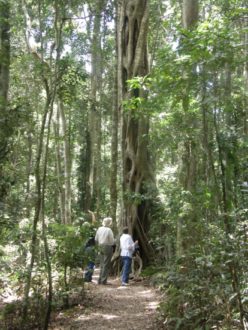Enjoyable, Memorable, Meaningful: Using wildlife interpretation to do it all
 Thursday-Friday 15 – 16 September 2016
Thursday-Friday 15 – 16 September 2016
This was a very successful and active workshop
Click HERE for a more detailed report on the workshop
A two day workshop was held at Binna Burra in the mountains near the Gold Coast, nestled between subtropical rainforest and eucalyptus forest
Well-presented interpretation, especially if interactive, can greatly add to the enjoyment and satisfaction of visitors, whether on a tour, visiting a wildlife park or staying at an eco-lodge, encouraging visitors to return or recommend the venue/tour to others.
It can also be an effective tool for management of visitor behaviour, helping them realize how their actions could affect wildlife and their habitats during their travels, and also encourage environmentally sound behaviour after returning home (e.g. choosing sustainable products, reducing waste that could harm wildlife and habitats, contributing by donations or direct involvement to conservation projects).
This was a workshop for tour operators, staff of ecolodges, wildlife parks and national parks, members of natural history associations, students, researchers, biology teachers and others interested in catching up with recent research and ideas for quality interpretation
Our keynote speakers and main discussion leaders were Professor Betty Weiler and Associate-Professor Rosemary Black, providing a wonderful opportunity to learn from and interact with these long-term and well-published researchers on effective interpretation, and with other experts from both academia and the tourism industry.
A summary from Betty:
Betty Weiler (SBaT, SCU) and Rosemary Black (Charles Sturt University) delivered an intensive 2-day workshop on the “how to” of wildlife interpretation at Binna Burra Mountain Lodge on Thursday 15th and Friday 16th September. The 33 participants ranged from novice wildlife tour guides to a few tour operator-guides with more than 30 years experience in the field. Most workshop participants were from the southeast Queensland and northern NSW regions including staff from wildlife attractions and facilities (Currumbin Wildlife Sanctuary, Cedar Creek Estate, Bat Hospital), wildlife and ecotour operators, museums, national parks, conservation groups, and universities. The workshop consisted of mini-lectures interspersed with individual and small group activities where participants applied what they were learning. Informed by research and practice, Rosy and Betty presented a number of principles that underpin successful interpretation. The principles were illustrated through role-modelling, DVD examples, and several guided walks. A world café activity helped tease out ideas for applying interpretive principles to reach new and/or challenging audiences. Issues such as the use of Aboriginal stories by non-indigenous guides, and wildlife feeding on tours and at resorts, were discussed and debated. Five experts delivered short sharp presentations on their research on interpretation in specific contexts such as whale-watching tours (Liz Hawkins, SCU), cage shark diving (Kirin Apps, SCU) and seal watching (Leah Burns, Griffith Uni). A large part of the success of the workshop was due to the openness of participants to new ways of working with visitors, and the willingness of participants to share their prior knowledge and experience, including what doesn’t work. Feedback from participants was very positive, with calls for the workshop to be delivered in other regions.
I would add that a follow-up workshop some time would be useful as so many items were touched on that could be explored in far greater depth. Meantime, we can continue to discuss in the comments below, and do remember to visit our research literature page, which includes references to articles on interpretation.
From SCU website
Betty has worked in Canada and Australia (and elsewhere) on interpretive tourism for many decades and is author of over 150 publications on the topic. The Southern Cross University, where she is currently employed, states: Within Australia, Betty is particularly well known for her contribution to visitor management and communication in protected areas, zoos and heritage attractions, and more recently on research aimed at influencing visitors’ on-site and post-visit behaviour. For a list of publications please see: https://works.bepress.com/betty_weiler/
Rosemary has had wide experience outside academia, having worked for the Ministry of Conservation in Victoria, St Kilda Council, National Trust, NSW National Parks and Wildlife Service and World Expeditions, in places such as Kosciuszko National Park, Myall Lakes National Park, Nepal, India, China, Tibet and Fiji.
From http://www.csu.edu.au/ses/staff/profiles/academic-staff/rosemary-black:
Rosemary joined CSU in 1995 and has taught a range of subjects, but specialises in interpretation, guiding, outdoor recreation and adventure tourism. Her research interests are interlinked with her teaching, with a focus on sustainability, sustainable behaviours, environmental communication, tour guiding and adventure tourism. She has published over 49 refereed publications and edited 4 books…Rosemary maintains strong links to the professions through her involvement and contribution to Interpretation Australia, Guiding Organisations of Australia and the Global Sustainable Tourism Council. She is on the Editorial Board of the Journal of Ecotourism and Journal of Interpretation Research. Rosemary holds a Ministerial appointment on the NSW National Parks and Wildlife Service, Southern Ranges Regional Advisory Committee.
Further details of workshop are here
